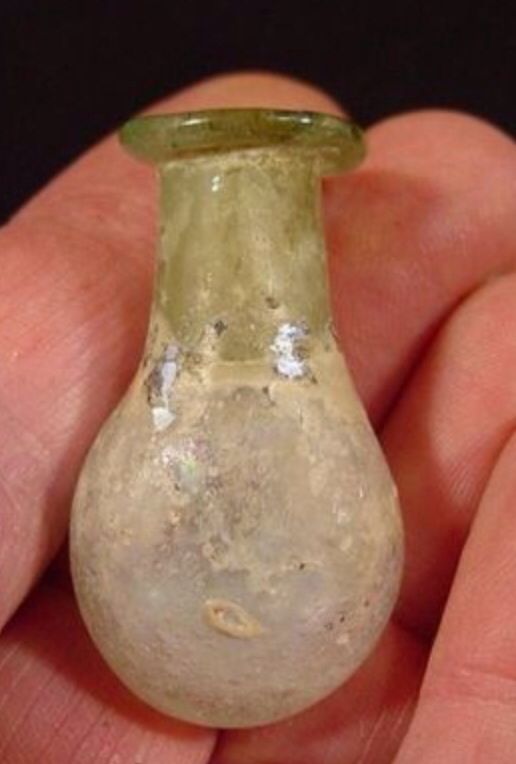
To listen to this reflection as a podcast, click here.
When you think of an archeologist painstakingly excavating an ancient site, what kinds of objects do you picture coming into view?
Coins, pottery, inscriptions, and shards of bone are valued finds. But one of the objects that frequently ends up in an archeologist’s bag is what you see above: a tear bottle.
At least 3,000 years ago, people in the Mediterranean world began the practice of collecting their tears in small vials. Romans preferred glass. Jews tended to use small clay vessels. Tears of loss, bereavement, and pain – not to mention love and joy – might be captured and then treasured as a special way to remember a person or event.
A tear bottle – technically called a lachrymatory – might be offered as a tender gift. Archeologists have found thousands of them clustered around cemeteries. Sometimes they were interred with the deceased. Family members and friends were making a silent statement: “This how much I miss you, this is how much I love you.”
The tradition was revived during the Middle Ages and again during Victorian times. Today you can order personalized tear bottles from a number of online vendors.
After all, there are just as many tears flowing in our own time as in the ancient world.
Lachrymatories are even mentioned in the Bible. David writes in Psalm 56:8, “You keep track of all my sorrows. You have collected all my tears in your bottle. You have recorded each one in your book.” This is extraordinary. God keeps track of our tears, recording them in “his book” as if maintaining a ledger of our most private moments of pain. And our tears end up not just in our own bottles, but in his bottle. We know of no other statement from the ancient world that rivals such an intimate expression of God’s love for hurting people.
In 1990, Bette Midler scored a major hit with From a Distance. She sings in the refrain, “God is watching us, God is watching us, God is watching us from a distance.”
But who wants a God who watches his messed-up creation from a distance? Would we feel drawn to someone gazing out from a 20th-story window at a mugging, a car wreck, or EMT’s struggling with a heart attack victim, but doing nothing at all to help?
The ancient Olympian gods and goddesses were certainly involved in this world’s affairs. But they were also a hot mess, blundering their way into human history displaying adolescent hormonal surges and personal vendettas. The classic Greek philosophers never took such myths seriously.
But when those same philosophers got around to describing actual deities– as in the case of Aristotle’s Prime Mover – they were reluctant to attribute anything like human emotions. If God really existed, God was impassive. Detached and uninvolved. Incapable of feeling happy, sad, angry, surprised, or disappointed. After all, if mere mortals could do anything that would launch the slightest ripple of emotion through the perfection of God’s spirit, that would make God vulnerable. The changeless God would be subject to change.
And that would mean God could not be God.
For the Hebrews, this was nonsense. Yahweh, by contrast, was a God who displayed an astonishing emotional bandwidth. According to Scripture, he could feel frustration, regret, and deep joy. He could roll up his sleeves and go to work, hold his people tenderly in his arms like a nursing mother, or fly into a rage like a jealous husband stricken by the discovery of his wife’s unfaithfulness.
And he could cry.
In John 11, Jesus’ eyes well up near the fresh grave of his friend Lazarus.
Jesus was saying, “This is what God the Father is like. He’s not on the sidelines of life, watching from a distance. He’s not neutral. He weeps with those who suffer. He welcomes our tears into his bottle.”
So what kind of God do you believe in?
You can be content, with the philosophers, to stick with all the “omni’s” – that God is omnicompetent (can do anything), omnipresent (exists everywhere), and omniscient (knows everything).
Or you can believe on this winter day that God is the kind of God who cries at funerals.
And that he cries along with you as well in all your darkest moments.
